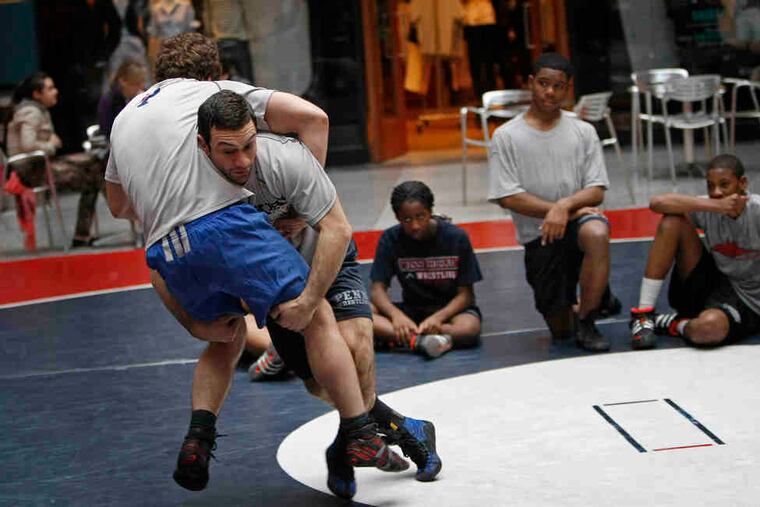Young grapplers get lessons in life
The youngsters displaying wrestling techniques to a curious lunchtime crowd at the Shops at Liberty Place on Thursday might never make it to an NCAA Wrestling Championship, like the one taking place next week at the Wells Fargo Center.

The youngsters displaying wrestling techniques to a curious lunchtime crowd at the Shops at Liberty Place on Thursday might never make it to an NCAA Wrestling Championship, like the one taking place next week at the Wells Fargo Center.
But because of Beat the Streets Philadelphia they at least will have a chance.
Imported here in 2008 from its New York birthplace by a pair of brothers who wrestled at Penn before moving onto Wall Street, the nonprofit organization uses the sport as a way to create better athletes and citizens in inner-city communities.
"Wrestling takes commitment and dedication," said Bruce Baumgartner, the four-time Olympic medalist who is a program supporter. "The harder you work in wrestling, the better you're going to do. And that's a lesson for life."
In Philadelphia and Camden, at schools and PAL and community centers, more than 400 children participate. They not only learn to wrestle, but are provided with academic and mentoring assistance.
"Their goal is to teach the values and work ethic that goes along with wrestling," said Andy Matter, a former Penn State wrestler from Upper Darby whose sons, Brett and Clinton, began Beat the Streets Philadelphia.
The younger Matters, both of whom have Wharton School degrees, had seen the program's success in New York, where nearly 2,500 youngsters participate. So they and a few Wharton buddies decided to try it here.
"It's pretty much been fully funded by my sons and their friends to this point," Matter said. "They've poured quite a bit of money into it. But they're doing it out of a love for the sport and a feeling that they just want things to get better."
If nothing else, Beat the Streets has established a ground floor for future wrestling success at inner-city high schools.
"I had a lunch with the coach at Camden High recently," said Matter, "and he's just ecstatic because he never had a feeder program before. These kids are really talented kids and they're taking to the sport very quickly."
Founded in New York in 2004 by former Hofstra wrestling coach Al Bevilaqua, Beat the Streets has spread into several other U.S. cities, including Chicago and St. Louis. Its primary lesson is that the kind of individual responsibility wrestling imparts can also be a pathway to success in life.
"No one else made a bad pass," reads a statement on the organization's website, "no one else dropped the ball; no one else missed the block; no one else drew the penalty. The individual wrestler learns that hard work, practice and dedication increases personal success."
The off-the-mat result, organizers said, is almost always better attendance and better grades.
"Wrestling," said Bevilaqua, "is magic."